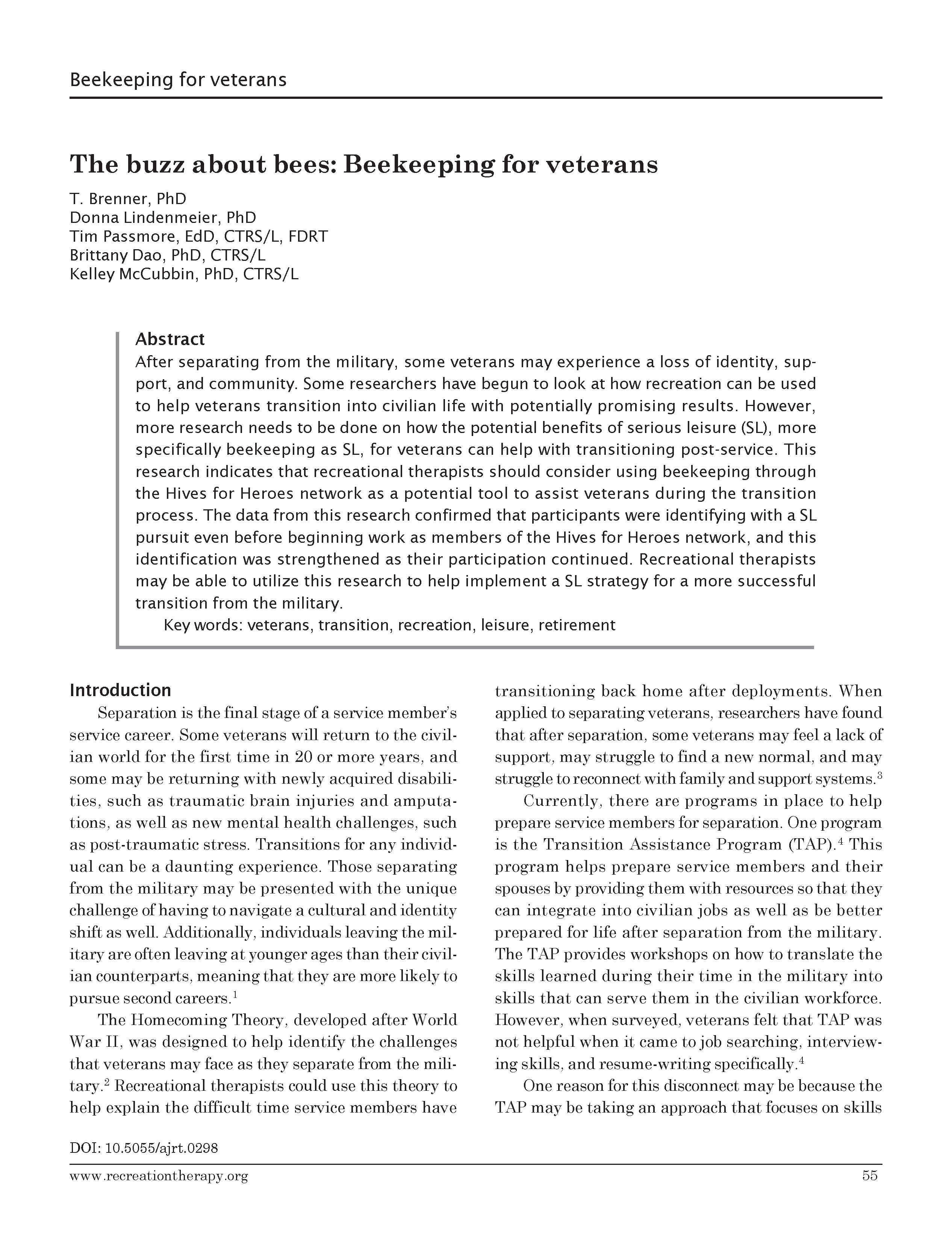The buzz about bees: Beekeeping for veterans
DOI:
https://doi.org/10.5055/ajrt.0298Keywords:
veterans, transition, recreation, leisure, retirementAbstract
After separating from the military, some veterans may experience a loss of identity, support, and community. Some researchers have begun to look at how recreation can be used to help veterans transition into civilian life with potentially promising results. However, more research needs to be done on how the potential benefits of serious leisure (SL), more specifically beekeeping as SL, for veterans can help with transitioning post-service. This research indicates that recreational therapists should consider using beekeeping through the Hives for Heroes network as a potential tool to assist veterans during the transition process. The data from this research confirmed that participants were identifying with a SL pursuit even before beginning work as members of the Hives for Heroes network, and this identification was strengthened as their participation continued. Recreational therapists may be able to utilize this research to help implement a SL strategy for a more successful transition from the military.
References
Keeling M, Kintzle S, Castro CA: Exploring US veterans’ post-service employment experiences. Mil Psychol. 2018; 30(1): 63-69.
Schütz A: The homecomer. Am J Sociol. 1945; 50(5): 369-376.
Ahern J, Worthen M, Masters J, et al.: The challenges of Afghanistan and Iraq veterans’ transition from military to civilian life and approaches to reconnection. PLoS One. 2015; 10(7): e0128599.
Silva E: Participation in the Transition Assistance Program and Job Placement Outcomes of US Veterans [open access master’s theses]. 2011. Available at https://digitalcommons.uri.edu/theses/114. Accessed October 1, 2024.
Duvall J, Kaplan RS-W: Exploring the benefits of outdoor experiences on veterans. 2013.
Duvall J, Kaplan R: Enhancing the well-being of veterans using extended group-based nature recreation experiences. J Rehab Res Dev. 2014; 51(5): 685-696. DOI: 10.1682/jrrd.2013.08.0190.
Duvall J, Kaplan R: Exploring the benefits of outdoor experiences on veterans. Report prepared for the Sierra Club Military Families and Veterans Initiative, University of Michigan, Ann Arbor, 2013.
Caddick N, Smith B: The impact of sport and physical activity on the well-being of combat veterans: A systematic review. Psychol Sport Exerc. 2014; 15(1): 9-18.
Elkington S, Stebbins RA: The SL Perspective: An Introduction. London: Routledge, 2014.
Atuel HR, Castro CA: Military cultural competence. Clin Soc Work J. 2018; 46(2): 74-82.
Campion C: Healing hives: Honey bees and the rehabilitation of veterans, 1919–2019. Bee World. 2019; 96(2): 55-59.
Rogers A: Broken survivors: With them through hell. Available at https://www.thebigq.org/2018/11/07/broken-survivors-with-them-through-hell/. Accessed November 7, 2018.
Duarte Alonso A, Kok SK, O’Shea M: Perceived contributory leisure in the context of hobby beekeeping: A multicountry comparison. Leis Stud. 2020; 40: 243-260.
Borkowski R: Wounded warriors go back to bee school. Bee World. 2017; 94(4): 119-121.
Creswell JW, Clark VLP: Designing and Conducting Mixed Methods Research. Thousand Oaks, CA: Sage Publications, 2017.
Gould J, Moore D, McGuire F, et al.: Development of the serious leisure inventory and measure. J Leis Res. 2008; 40(1): 47-68.
Miles MB, Huberman AM, Saldaäna J: Qualitative Data Analysis: A Methods Sourcebook. 3rd ed. Thousand Oaks, CA: Sage Publications, Inc., 2014.
Kleiber DA, Linde BD: The case for leisure education in preparation for the retirement transition. J Park Recreat Adm. 2014; 32(1): 110-127.
Stebbins RA: Serious leisure: A conceptual statement. Pacific Sociol Rev. 1982; 25(2): 251-272.

Published
How to Cite
Issue
Section
License
Copyright 2000-2025, Weston Medical Publishing, LLC and American Journal of Recreation Therapy. All Rights Reserved.

